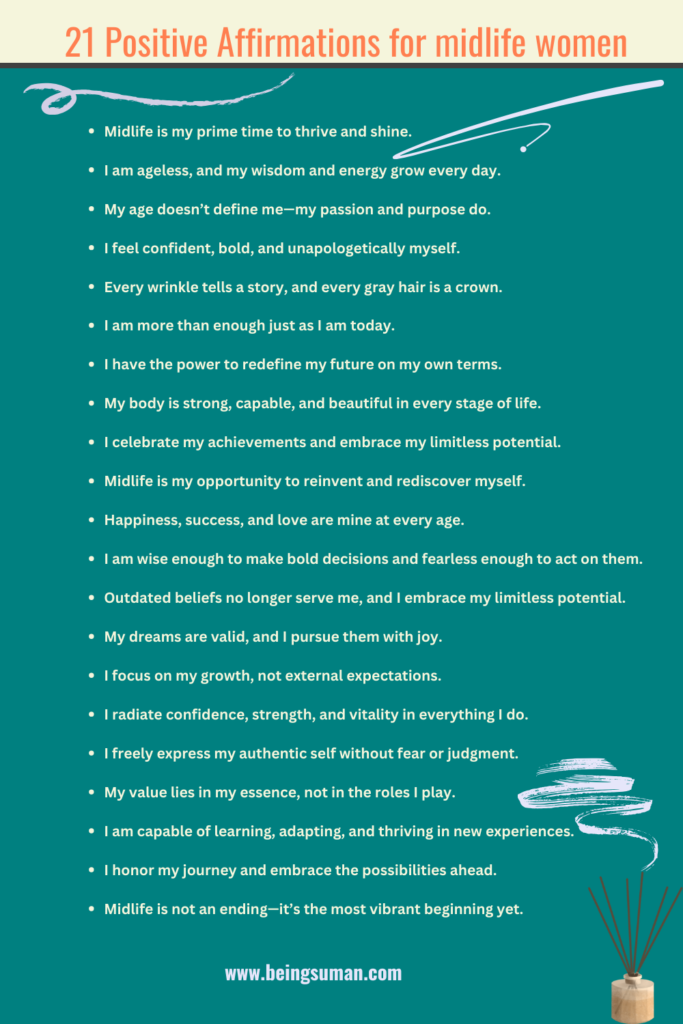What is Positive Affirmation?
The concept of positive affirmations is simple, really. It’s just a statement, but one spoken with intention and positivity.
Yet, if you’re like most people, the skeptic in you might immediately question it. “Really? If I keep repeating, ‘I am powerful,’ I’ll actually become powerful?”
And trust me, a midlife mindset can be rigid enough to resist this idea of positive affirmation.
A decade ago, if someone had told me that a few positive phrases could change my life, I would have smiled politely and probably rolled my eyes the second they looked away.
After all, I’d have thought, “Doesn’t my 40-some years of hard-earned wisdom count for anything over this ‘wishful thinking’?”
I didn’t buy it at first, either. I took in the idea and let it simmer somewhere in the background of my mind—but it took years before I actually began trying daily positive affirmations for myself.
So if you’re thinking, “How can repeating something in the mirror do anything?” you’re in good company! Positive affirmations don’t always get a warm welcome, especially when you first hear about them. It’s important to acknowledge negative emotions as well, as dismissing them can lead to emotional invalidation and hinder genuine emotional processing.
Most of us are perfectly okay thinking negative thoughts all day long, even believing them, but we’re totally suspicious of positive ones. Isn’t it ironic?
This brings us to self-affirmation theory, which is a fancy way of saying that focusing on our strengths and values can boost our resilience and help us maintain a more positive self-image.
But here’s what finally got me on board with positive affirmations.
I decided to suspend my disbelief.
If we can sit down and willingly watch hours of Netflix, believing every gravity-defying, science-bending action scene they throw at us, surely we can give positive affirmations the same chance, right? Especially if they might actually do us some good.
That was enough to convince me—but for you, I wanna throw one more logic-
that nagging voice in our heads, the one that loves replaying a loop of negative self-talk.
Keeping us in that cycle of generating negative thoughts and feeding self-doubt.
“You could have done better,” and points out everything you didn’t get done, every goal you haven’t reached, every little flaw.
Instead of letting that shit play in loops, why not turn to something powerful. And that’s where positive affirmations come in.
So, what are positive affirmations?
Why are people so passionate about them?
And why is it so important to accept, adapt, and practice them in midlife?
Let’s dive in.
What is Positive Affirmation?
Positive affirmations are short, powerful statements that you repeat to yourself—kind of like giving yourself a little uplifting talk.
Think of them as verbal high-fives! You might say things like,
“I am capable of achieving my goals,” or
“I deserve success and happiness.”
Now, these statements aren’t just feel-good fluff meant to be shouted into the mirror (though, if that’s your style, go for it!).
They’re designed to encourage positive thinking, boost self-confidence, and build healthier self-esteem—slowly but surely, like a mental workout routine. They also help counteract negative feelings, reduce negative self-talk, and promote mental well-being.
In midlife, affirmations can be especially powerful if you want to train your mind for positive thinking.
We often navigate big changes, rethink our paths, and sometimes confront a chorus of “should-haves” or “what-ifs.”
Affirmations can help us quiet that noise and refocus on what truly matters to us right now. They become reminders that redefining our goals and celebrating our strengths in this new season is okay.
Here’s a way to think about it: positive affirmations are like planting seeds in your mind. Every time you repeat one, you give it a little splash of water and sunlight.
Over time, these seeds of positivity start growing strong, pushing out the weeds of self-doubt, criticism, and that inner voice that’s convinced you to believe that you have missed the life memo.
In midlife, they’re a daily reminder that there’s always room to grow, shift, and see ourselves in a new light.
So yes, maybe they’re just words. But when said with a sprinkle of belief (and a touch of persistence), they can help create a mindset that’s not only kinder but also way more fun to live with, especially in this phase where we’re embracing change and looking forward.
What is an example of an Affirmation?
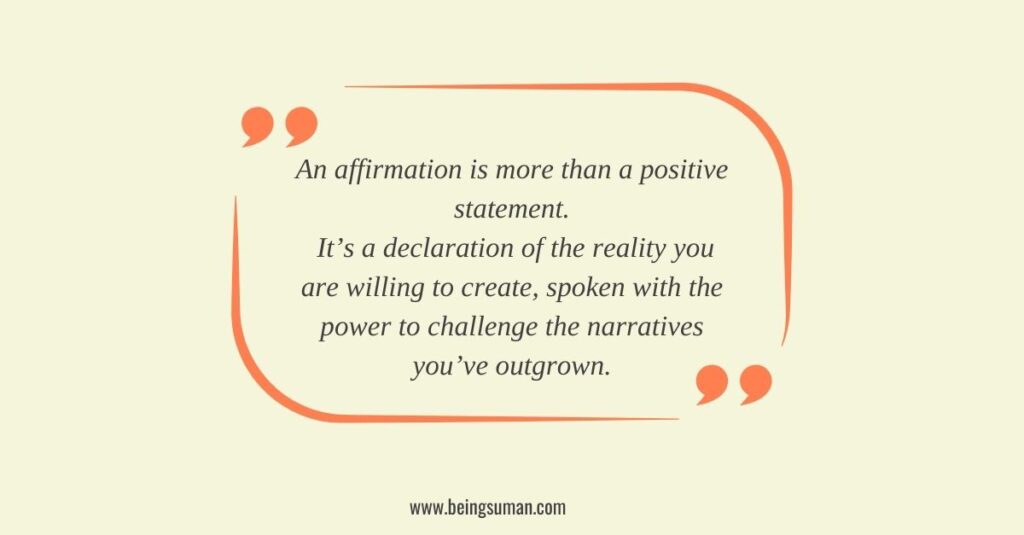
Positive affirmations can be as unique as you are, but they all have a few things in common: they’re rooted in positivity, spoken in the present tense, and meant to give you a lift like a friend cheering you on. Here are some examples:
These statements can be customized to fit your goals, whether you’re focusing on self-acceptance, physical health, or simply embracing a more positive outlook. Additionally, aligning affirmations with your core personal values can effectively boost self-esteem and maintain a positive self-identity.
“I am enough just as I am.”
“I am capable of achieving my dreams.”
“I trust in my abilities and my journey.”
“I choose joy and positivity.”
“Every challenge I face is an opportunity to grow.”
These statements can be customized to fit your goals, whether you’re focusing on self-acceptance, physical health, or simply embracing a more positive outlook. They can remind us to appreciate how far we’ve come, even if the road wasn’t always easy or straightforward.
In a world where strangers (and even our inner critic) feel free to tear us down, why not create your own shield of positive affirmations? With these statements, you’re building resilience so that negativity just bounces off—and you’re left standing strong, focused on what truly matters.
Affirmations can be tailored for any goal, challenge, or phase of life. Whether it’s business, healing, money, self-love, or just getting through a busy Monday, there’s an affirmation ready to cheer you on. Here are some ideas to get started:
For Business Goals
Are you trying to boost confidence at work or tackle a big project? Here are affirmations to make your career feel a little less like a high-wire act:
“I am fully capable of achieving my business goals.”
“Every challenge is just another chance to get stronger and wiser.”
“I attract opportunities that align with my vision.”
For Healing
On a healing journey—physically or emotionally? These affirmations can feel like a warm, supportive friend:
“I’m healing in my own way and my own time.”
“I let go of the past and choose wellness every day.”
“My body and mind are both becoming stronger and healthier.”
For Money & Abundance
Who doesn’t want a bit of financial peace? These affirmations help money feel less stressful and more welcoming:
“I am open to receiving abundance in all its forms.”
“Money flows to me effortlessly.”
“I’m grateful for the financial stability I’m building.”
For Self-Love & Confidence
Need a reminder that you’re more than enough? These affirmations are here to help you feel that self-worth:
“I love and accept myself just as I am.”
“I am worthy of love, joy, and respect.”
“I trust in my abilities, and I’m proud of who I am.”
For Mondays (or Any Day that Needs a Kickstart)
Who says Mondays have to be dreadful? A little affirmation can set you on the right track for the week:
“I’m stepping into this week with positivity and focus.”
“I’m ready to handle any challenge this week calmly and grace.”
“This week, I choose to move forward with confidence.”
Midlife Affirmations: Embracing Change with Confidence
Midlife can be a season of reinvention and reflection. We’re redefining goals, letting go of old beliefs, and rediscovering strengths we might have forgotten about.
Positive affirmation in this stage can be a powerful way to stay grounded and focused on self-compassion, resilience, and possibility.
Here are a few positive daily affirmations crafted specifically for the midlife journey:
“I embrace change and welcome new chapters in my life.”
“I honor my journey and all that I’ve learned along the way.”
“I am open to new possibilities and excited for what’s next.”
“I am proud of who I am and trust my inner wisdom.”
“I deserve joy, peace, and fulfillment at every stage of life.”
These affirmations can remind us that, while midlife comes with its own challenges, it’s also a time to celebrate growth, resilience, and our unique wisdom and stay in positive mood.
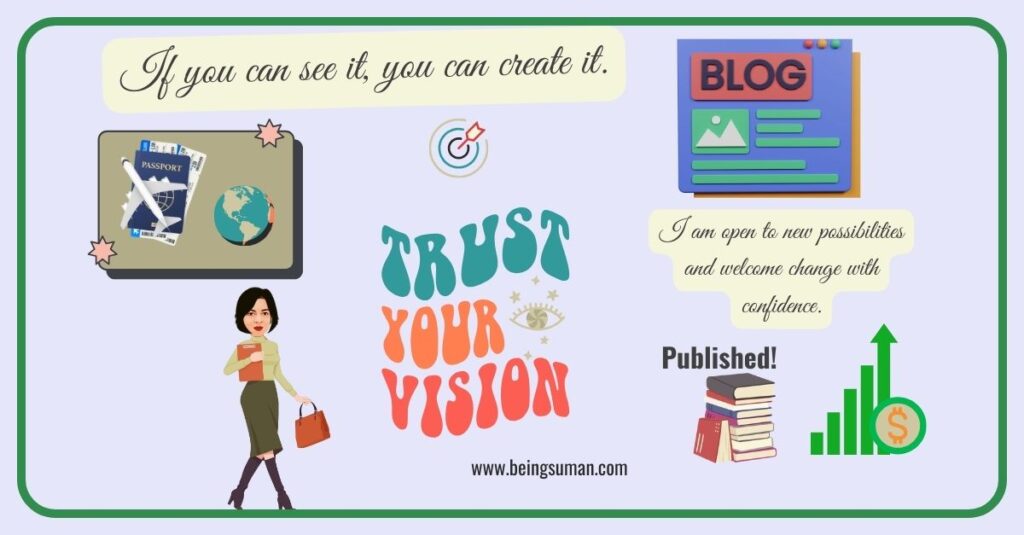
What is a Positive Affirmation to Say Every Day?
In midlife, we often reflect on what’s important, and affirmations can help us stay focused on what we want to welcome into our lives daily.
Keep it simple, and choose something that feels meaningful to you. Here’s a great one to start with:
“I am worthy of love, success, and happiness.”
This affirmation is broad but impactful, touching on self-worth and happiness. It’s a reminder that we’re deserving of good things, no matter what life stage we’re in. Another one to consider:
“I am open to the good things coming my way today.”
This affirmation can set a positive tone, helping us stay open to new possibilities, even if they differ from what we imagined earlier in life.
In midlife, affirmations like these are powerful reminders that each day holds potential—whether it’s for new experiences, joy, or simply a moment of peace.
Try choosing one simple affirmation to start each morning, allowing it to ground you and set the tone for the day ahead.
How Positive Affirmations Work?
You might think, “Okay, so I say a few sentences in the mirror—is that really going to change anything?” Fair question!
Here’s where it gets fascinating. Research in psychological science and affective neuroscience shows that when we practice positive affirmations, we actually activate specific brain areas related to self-worth and motivation.
Think of it as a mental workout, targeting the parts of our brain that control how we see ourselves and what we believe we’re capable of—a powerful tool, especially in midlife, when we sometimes face big transitions and self-doubt.
According to self-affirmation theory (yes, it sounds fancy!), repeating affirmations engages brain parts associated with “self-related processing.” Cultivating positive thoughts through these affirmations can combat negative self-talk and promote a more optimistic mindset.
In other words, when we say positive things about ourselves, we’re slowly training our brain to accept these ideas as true, even if they initially feel a little new.
In midlife, this means we can start replacing those long-standing negative beliefs—like “I’m too old to start fresh” or
“It’s too late to make a change”—with affirmations encouraging a more supportive mindset.
Over time, affirmations help us strengthen the pathways in our brain that promote confidence, resilience, and openness to possibility.
So yes, a few sentences in the mirror can actually make a big difference in how we see ourselves and what we believe is still possible.
What Are the Benefits of Affirmations?
The benefits of affirmations go beyond just “thinking happy thoughts.” In midlife, they can reconnect with our true selves, reshape our mindset, and create a foundation for whatever comes next. Here are some ways affirmations can make a meaningful difference:
Reduced Stress:
Midlife brings its own set of stressors, from career changes to family responsibilities. Affirmations can help us manage that stress by shifting our focus to positive statements that keep us calm and centered.
Enhanced Self-Esteem:
As we reach this stage, we sometimes question our worth or feel the weight of past decisions. Affirmations can be a daily confidence boost, gently reminding us that we are capable and worthy of good things, no matter what our past looks like.
Improved Physical Health:
It’s amazing how the mind and body are linked. Lower stress and a positive mindset can contribute to better physical health, helping us feel more resilient as we navigate the years ahead.
Affirmations can be a powerful practice in midlife to ground us, renew our confidence, and remind us of our strengths. They give us a way to center ourselves, embrace self-compassion, and positively approach life’s next chapters.
Why Are Affirmations So Powerful?
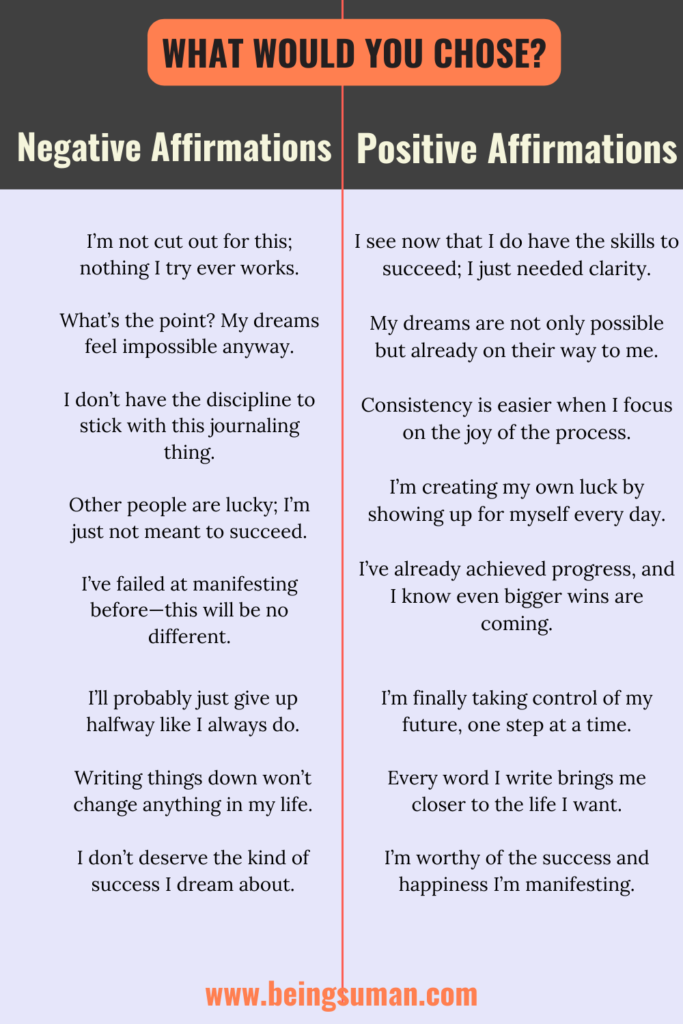
Affirmations work because they cut right to the heart of what we believe about ourselves, which can be especially important in midlife.
This stage often brings a mix of reflection and change, where we’re reassessing what truly matters, and sometimes, we encounter doubts about what we’re capable of. Affirmations help us strengthen our core values and give us a needed boost, especially during those times when life feels challenging or uncertain.
Think about it—if a few negative experiences or doubts can convince us that we’re somehow “not enough” or “too late” for certain dreams, doesn’t it make sense to balance that out by planting positive beliefs instead?
Imagine you’re preparing for a new career step, or even a personal project you’ve put off for years. Repeating an affirmation like “I am prepared and confident” not only calms any nerves but builds up your resolve.
Affirmations replace those outdated, unhelpful stories with new, empowering ones. Over time, they create a stronger foundation, helping us view ourselves in a positive light and, yes, to actually believe that there’s always room for growth, change, and joy—even in midlife.
What Do Affirmations Do to the Brain?
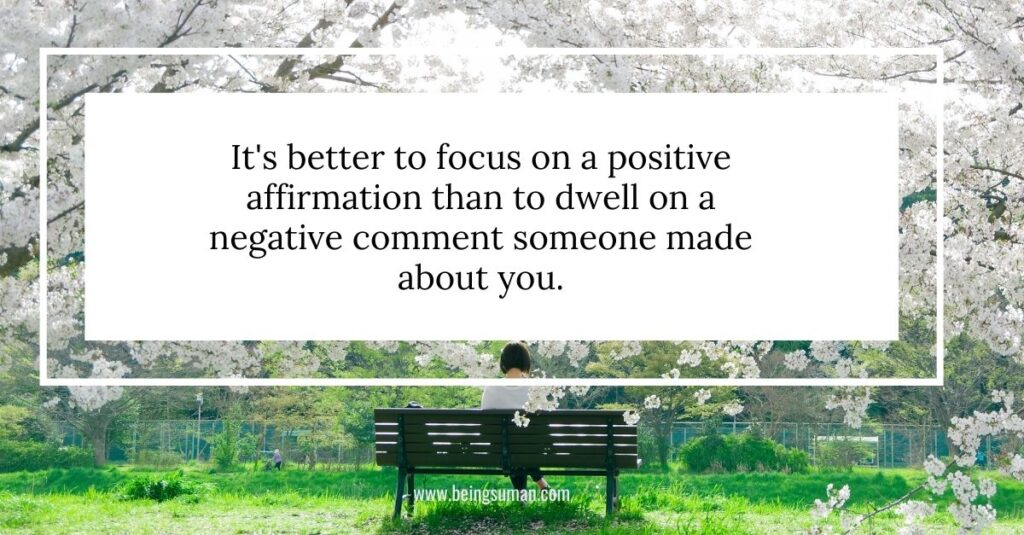
Positive statements can actually change the way our brains are wired over time.
When we repeat affirmations, our brain’s “reward centers” light up, creating stronger connections that reinforce positive thought patterns. By practicing positive affirmations daily, we create new neural pathways.
By thinking negative thoughts, we also create neural pathways for staying negative and responding negatively. Now, with your midlife wisdom, you can better choose what can better care for your emotional health.
Think of it as carving a new path in the forest. At first, it’s barely visible, but with each step (or affirmation), the path gets clearer and easier to follow.
Over time, affirmations strengthen the pathways in our brain that make positive thinking a more natural response, which can be especially helpful in midlife, when we’re re-evaluating priorities and sometimes dealing with long-standing self-doubt.
In practical terms, this means that affirmations can literally reshape how we respond to stress, uncertainty, and change. Instead of falling into patterns of worry or self-criticism, affirmations help us turn up the volume on self-compassion, confidence, and resilience.
For those of us in midlife, it’s a way to rewire our brain’s response to life’s challenges, creating a more positive and empowered outlook.
Is it Good to Do Affirmations Every Day?
In many cultures, daily mantras or chants are a common practice, and there’s a reason for it: the mind loves patterns. The more we repeat something, the more it sticks—until that thought or belief becomes part of our mindset.
The mind loves patterns, and daily affirmations can establish a routine that’s both grounding and empowering.
In midlife, daily affirmations can be like a reset button for the mind.
Think of practicing positive affirmations every day like working out, but for your mindset.
Just as regular exercise strengthens the body, daily affirmations strengthen positive thinking, gradually loosening the grip of old doubts and fears.
Doing affirmations is a way to build up self-compassion, boost confidence, and reinforce a positive outlook.
Even starting small with one or two affirmations each morning can make a lasting difference over time, helping us approach each day with renewed optimism, clarity, and a reminder of our own resilience.
Why Are Positive Self-Affirmations Important?
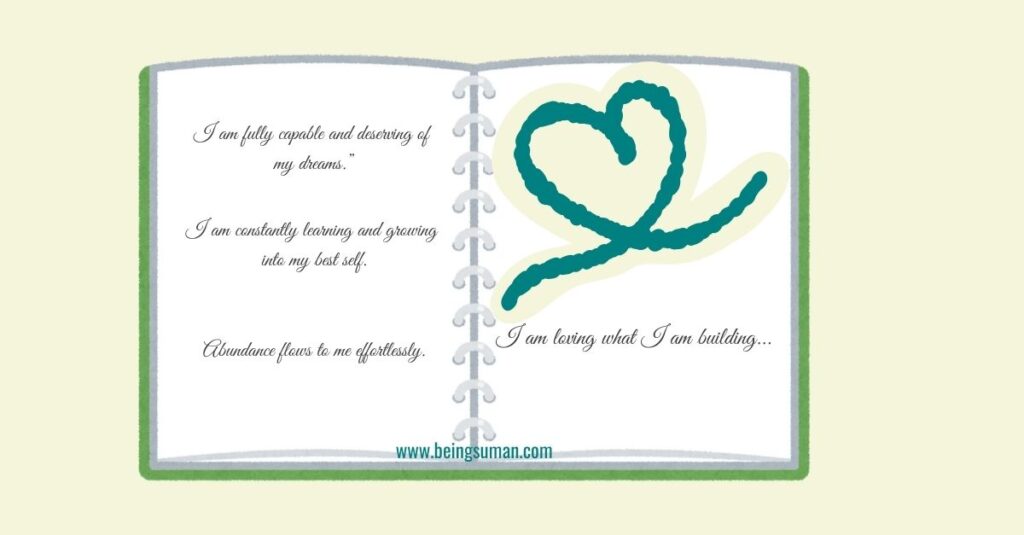
Let me explain this with an example. Think of a typical TV commercial. It might suggest that you’re too skinny and need their protein shake or that your skin is sagging and it’s all over if you don’t buy their miracle cream. Sound familiar?
In a world that constantly bombards us with messages of “not enough,” affirmations act like a grounding force, reminding us that we’re perfectly whole right here and now. They’re like a mental springboard, bouncing us back to our worth, resilience, and positive self-image.
Self-affirmations are little reminders that we’re not defined by setbacks or anyone’s idea of “flaws” but by our potential and unique value. They help us shake off the noise and stay connected to what’s true and positive about ourselves. In other words, they help us see ourselves through our own eyes, not the critical lens of others.
Do Positive Affirmations Really Work?
Yes, they do—but with a little catch.
Back in school, I was practically convinced I was a “dufus” when it came to academics, and let’s just say those kinds of beliefs have a way of sticking around—even into midlife! Many of us carry those limiting beliefs with us, often without realizing how they affect our confidence and choices.
That’s where affirmations come in—they help by replacing those old, outdated beliefs with something better. And let me emphasize: affirmations work best when practiced consistently and with intention.
Like any skill, affirmations take a bit of time before you see noticeable changes. It’s about gradually shifting those ingrained negative thoughts to positive ones until they become your default setting.
So, do affirmations work? Absolutely! But they work best when you believe in their potential and give them the daily practice they deserve. In midlife, they can be a powerful way to break free from old stories and embrace the confidence to create new ones.

It is your turn to Practice Positive Affirmations
I come from a background steeped in Vedic chants and mantras, and chanting is practically in my DNA. So, when I reframed affirmations as a form of personal chanting—not in praise of deities, but as positive words I say to myself—it finally clicked.
In midlife, I’d much rather repeat 100 positive statements that build my self-confidence than hold onto a single negative thought someone else planted in my head years ago. This stage of life is a powerful time to rewrite old scripts, to leave behind the labels and doubts we’ve carried for too long, and to embrace new beliefs that serve us better.
Positive affirmations are more than just feel-good phrases. They’re a way of building a stronger, more resilient mindset, breaking free from self-doubt, and embracing a life that’s focused on growth, self-acceptance, and possibility. Affirmations remind us that every stage of life holds potential and that we are always capable of creating change, no matter our age or past experiences.
Remember, affirmations are a practice, not a quick fix. Start small, stay consistent, and watch as these words become a force for positive change in your life. It’s your turn—try affirmations and see where they take you. You might be surprised at the difference they make, especially in midlife, when a little self-kindness can go a long way.
